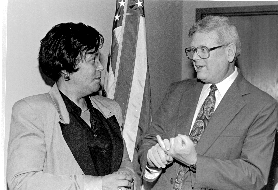
 |
On Campus:
Christine A. Rowett |

When Carl Stokes became a member of the newly formed Board of School Commissioners in Baltimore City a few months ago, he was told not to harbor any high expectations. "Your board should be looking at painting the buildings and planting flowers," Stokes said others told him. "That's the best you can do in your first year. "We said, 'Well, we're just stupid like this, but we're going to try to make a difference for our students this year, in the first year.'" Stokes and three other school board commissioners addressed more than 100 area educators and researchers recently at a daylong symposium that focused on the needs of city students and schools. The event, titled "A Celebration of Schools," was held at the School of Continuing Studies' Downtown Center. The symposium was the fifth in a series of lectures funded by a grant from Arthur Lichtenstein, '30 and '34, to promote awareness of the needs of public schools in the area. Past Lichtenstein lectures have included presentations by leading national scholars from Georgia State University and the Bank Street College of Education. Stokes said the nine-member board has ignored advice to "go after the low-hanging fruit" and instead set their sights on improving student achievement in Baltimore's classrooms. "That's our challenge," he said, "not to prove it to anyone else, but to do it for our young people this year." The question and answer session with board members was arranged, in part, to discuss the new partnership between Baltimore City Schools and the state of Maryland. Robert Schiller, interim superintendent of Baltimore City Schools, had planned to attend but had a last-minute scheduling conflict. "There is an awful lot to do and it's hard to know where to start," said Bonnie Copeland, executive vice-president of the Greater Baltimore Committee. "None of the least of which is getting curriculum in place." Copeland said she and other board members have been encouraged by the amount of support and optimism received from community members and parents. But board member Patricia Morris said that has not always been the case. "When we first came together as a board, most people wanted to see positive change but were not actually convinced that positive change was going to take place," Morris said. Dorothy Siegel said most people--herself included--are afraid of change and reform as they are unfamiliar concepts. As a new board member expected to make decisions on behalf of students, she has been doing her homework. "For me it's been a matter of daily learning," Siegel said. "I can't count the reams of paper that I have already read; my rooms are overflowing." Siegel said one thing all board members agree on is the ineffectiveness of limiting what students can learn. "We've known from learning theory that all of us are capable of learning much more, that we have no idea of the limit of what any person can learn," she said. "For anybody to come along and set a limit on expectations defies all that we have learned in the last 50 years." Siegel also believes there has been a change in thinking over the last 20 or 40 years about who should be educated. "I think we had a feeling that only those people who learned should be educated and the rest of them were not worthy," she said. "It was a self-fulfilling prophecy." Today's educators have an increased awareness of the significance of curriculum, teaching methods and parental involvement in learning, she said. She would like to see educators raising standards for all students, who, in turn, will want to reach the next level, she said. She would like to see educators raising standards for all students, who, in turn, will want to reach the next level, she said. "How far you go depends on how much support is there," Siegel said. "There are unending possibilities to what we can learn." Stokes told the group that establishing a working school board was initially a major challenge, as many school system staff member positions were unfilled. "We walked into a situation where 15 of the top management people were gone," Stokes said, making no apologies. "We could have taken a year or six months to [get organized]. What we have done is take advantage of our own resources." Morris said the board is actively seeking to fill the empty positions and will "happily take a lesser role" when a permanent superintendent is hired. Today, Stokes said, "I'm just surprised that nine know-it-people can work so well together. And we are working together." Vinetta Jones, former dean of education at Morgan State University and the director of Equity 2000, opened the day's events with a keynote address that focused on education reform. Equity 2000, she said, aims to help all students reach high standards. The program uses ongoing professional development for teachers, parental involvement and partnerships with other schools and universities as components for success.
Go back to Previous Page
|